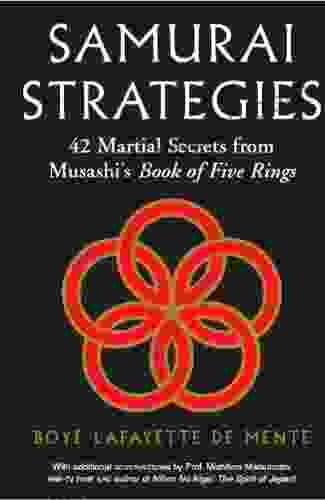Unveiling the 42 Martial Secrets from Musashi's Legendary Tome: The Book of Five Rings

Miyamoto Musashi, a legendary Japanese swordsman and strategist, left behind a profound legacy through his seminal treatise, The Book of Five Rings. This revered martial arts manual distills Musashi's decades of combat experience and strategic brilliance into a series of 42 essential principles. These secrets transcend mere swordsmanship, offering invaluable insights into human nature, strategy, and personal growth.
1. Mastery Lies in the Void:
Musashi emphasizes the importance of mental and emotional detachment, finding stillness within the chaos of battle. By emptying the mind of distractions, warriors can perceive the true nature of the situation and respond with clarity and precision.
4.5 out of 5
| Language | : | English |
| File size | : | 1414 KB |
| Text-to-Speech | : | Enabled |
| Screen Reader | : | Supported |
| Enhanced typesetting | : | Enabled |
| Word Wise | : | Enabled |
| Print length | : | 162 pages |
2. The Bow and the Sword:
Musashi distinguishes between the long-range perspective of a bowman and the close-quarters combat of a swordsman. He advises warriors to adapt their strategies based on the distance and circumstances, using different tools and techniques to achieve victory.
3. The Essence of Void and Form:
Musashi recognizes the duality of existence, the interplay between emptiness and solidity. He urges warriors to understand the power of both, finding balance and harmony in their movements and strategies.
4. The Four Mental States of a Warrior:
Musashi identifies four distinct mental states that influence a warrior's performance: fear, hesitancy, pride, and arrogance. He cautions against these distractions and advises cultivating a calm and focused mind.
5. The Principles of Distance:
Musashi emphasizes the importance of controlling distance in combat, understanding the optimal ranges for different weapons and techniques. He teaches warriors to move, strike, and defend with precision, taking advantage of their reach and the enemy's vulnerabilities.
6. The Seven Virtues of a Warrior:
Musashi extols the virtues of humility, politeness, bravery, truthfulness, compassion, selflessness, and honor. He believes these qualities are essential for a true warrior, both on and off the battlefield.
7. The Art of Vision:
Musashi stresses the importance of observation and perception in combat. He advocates for developing a keen eye that can anticipate the opponent's movements and discern their intentions.
8. The Stance of the Mind:
Musashi teaches that the true stance of a warrior is not a physical position but a mental state of alertness and preparedness. He emphasizes the need for a flexible and adaptable mind that can respond swiftly to changing circumstances.
9. The Indirect Approach:
Musashi advises warriors to employ indirect and unconventional tactics when facing a superior opponent. He encourages them to use deception, surprise, and psychological warfare to gain an advantage.
10. The Power of Timing:
Musashi recognizes the critical role of timing in combat. He teaches warriors to seize the initiative, anticipate the opponent's moves, and strike at the optimal moment for maximum impact.
11. The Theory of Strategy:
Musashi shares his insights into military strategy, emphasizing the importance of planning, reconnaissance, deployment, and adaptability. He urges warriors to study the tactics of great generals and apply their wisdom to their own battles.
12. The Principles of the Wind:
Musashi likens the movements of a warrior to the wind, which is unseen but exerts a powerful force. He advises warriors to cultivate a supple and elusive style that allows them to move and strike with fluidity and grace.
13. The Art of Battlefield Deception:
Musashi teaches the importance of deception in combat, advocating for the use of feints, disguises, and other strategies to confuse and outmaneuver the enemy.
14. The Spirit of the Sword:
Musashi emphasizes the importance of an indomitable spirit, a warrior's unwavering resolve and determination. He believes that a strong spirit can overcome physical limitations and adversity.
15. The Three Realms of Military Strategy:
Musashi divides military strategy into three realms: the strategy of battles, the strategy of campaigns, and the strategy of state. He discusses the different principles and considerations involved in each level of warfare.
16. The Psychology of Surrender:
Musashi recognizes that surrender can be a strategic choice, allowing a warrior to conserve resources and regroup for future battles. He teaches warriors to assess the situation and make the difficult decision to surrender when necessary.
17. The Principles of Attack and Defense:
Musashi provides detailed guidance on the principles of attack and defense, emphasizing the importance of timing, positioning, and the use of different techniques to overcome an opponent's strengths and exploit their weaknesses.
18. The System of Kenjutsu:
Musashi outlines his system of swordsmanship, including specific techniques, stances, and strategies for different combat situations. He stresses the importance of constant training and practice to master the art.
19. The Heart of Water:
Musashi likens the warrior's mind to water, which is adaptable, fluid, and capable of overcoming any obstacle. He advises warriors to cultivate a mind that is calm, flexible, and responsive.
20. The Four Qualities of a General:
Musashi identifies four essential qualities of a great general: wisdom, benevolence, courage, and strictness. He believes that these qualities are necessary for leading an army effectively and achieving victory.
21. The Theory of the Moon's Mirrors:
Musashi introduces the concept of the moon's mirrors, which refers to the ability to anticipate an opponent's moves and counter their strategies. He teaches warriors to observe and learn from their opponents, predicting their actions and adjusting their own accordingly.
22. The Principles of Leadership:
Musashi provides insights into the principles of leadership, emphasizing the importance of inspiring soldiers, maintaining discipline, and setting a positive example. He believes that a strong leader can unite a group and achieve great things.
23. The Strategy of the Weak:
Musashi acknowledges that warriors may sometimes find themselves in a disadvantageous position. He teaches them to employ the strategy of the weak, using unconventional tactics, guile, and deception to overcome a superior opponent.
24. The Art of Compassion:
Musashi believes that even in the midst of battle, warriors should strive to show compassion for their enemies. He advocates for sparing the lives of defeated opponents and treating them with respect.
25. The Importance of Training:
Musashi emphasizes the critical importance of constant training and practice for a warrior's development. He encourages warriors to engage in regular physical and mental exercises to refine their skills and improve their readiness for combat.
26. The Power of Void:
Musashi stresses the importance of void in combat, referring to an empty space or moment that allows a warrior to move freely and respond to changing situations. He teaches warriors to create void by emptying their minds and moving in an unpredictable manner.
27. The Theory of the Battlefield:
Musashi provides a comprehensive analysis of the battlefield, including its different elements, such as terrain, weather, and troops. He discusses the importance of understanding the factors that influence combat and adapting strategies accordingly.
28. The Principles of Self-Discipline:
Musashi emphasizes the importance of self-discipline for a warrior's success. He believes that warriors must control their emotions, desires, and impulses to maintain focus and make sound decisions in the heat of battle.
29. The Strategy of Self-Awareness:
Musashi teaches the importance of self-awareness
4.5 out of 5
| Language | : | English |
| File size | : | 1414 KB |
| Text-to-Speech | : | Enabled |
| Screen Reader | : | Supported |
| Enhanced typesetting | : | Enabled |
| Word Wise | : | Enabled |
| Print length | : | 162 pages |
Do you want to contribute by writing guest posts on this blog?
Please contact us and send us a resume of previous articles that you have written.
 Fiction
Fiction Non Fiction
Non Fiction Romance
Romance Mystery
Mystery Thriller
Thriller SciFi
SciFi Fantasy
Fantasy Horror
Horror Biography
Biography Selfhelp
Selfhelp Business
Business History
History Classics
Classics Poetry
Poetry Childrens
Childrens Young Adult
Young Adult Educational
Educational Cooking
Cooking Travel
Travel Lifestyle
Lifestyle Spirituality
Spirituality Health
Health Fitness
Fitness Technology
Technology Science
Science Arts
Arts Crafts
Crafts DIY
DIY Gardening
Gardening Petcare
Petcare Dr Harper
Dr Harper Krista Marson
Krista Marson Steve Olson
Steve Olson Silvia M Lindtner
Silvia M Lindtner Michael Burnett
Michael Burnett Barb Musick
Barb Musick Stacey A Shannon
Stacey A Shannon Becky Wade
Becky Wade Anna Watson
Anna Watson L J Martin
L J Martin Peter Richmond
Peter Richmond Geryn Childress
Geryn Childress Robin Esrock
Robin Esrock Bob Labbe
Bob Labbe C J Brown
C J Brown Dave Hall
Dave Hall Boye Lafayette De Mente
Boye Lafayette De Mente Julia Galef
Julia Galef John Van Wyhe
John Van Wyhe Tali Sharot
Tali Sharot Ben Shneiderman
Ben Shneiderman Finn Aagaard
Finn Aagaard J Scott Long
J Scott Long Sally Annjanece Stevens
Sally Annjanece Stevens Ling Seto
Ling Seto Elizabeth Wissner Gross
Elizabeth Wissner Gross Sara Dyer
Sara Dyer Jenn Bennett
Jenn Bennett College Hippo
College Hippo James P Sethna
James P Sethna L A Cotton
L A Cotton Eddie Jones
Eddie Jones Randy J Paterson
Randy J Paterson J E Esslemont
J E Esslemont Neel Doshi
Neel Doshi Peter L Falkingham
Peter L Falkingham Kyung Won Chung
Kyung Won Chung Douglas Perry
Douglas Perry Stan Gibilisco
Stan Gibilisco Frank Thomas
Frank Thomas Matthew Cobb
Matthew Cobb Philip Gibson
Philip Gibson Steve Newell
Steve Newell Bernard Stiegler
Bernard Stiegler Charles Dickens
Charles Dickens Jessa Stone
Jessa Stone Aaron Mahnke
Aaron Mahnke Justine Gregory Williams
Justine Gregory Williams Gilbert J Grant Md
Gilbert J Grant Md Lexi Ryan
Lexi Ryan June Hur
June Hur Anne Sylvie Malbrancke
Anne Sylvie Malbrancke Johnny Chuong
Johnny Chuong Claire Walter
Claire Walter Julie C Meloni
Julie C Meloni Zach Hunter
Zach Hunter Adele Faber
Adele Faber David Woods
David Woods Henry Dillon
Henry Dillon Shawn Shallow
Shawn Shallow Michael G Manning
Michael G Manning Larry Thornberry
Larry Thornberry Steven A Fino
Steven A Fino Dan Koboldt
Dan Koboldt Tanmay Mehta
Tanmay Mehta Suzanne Clark
Suzanne Clark Gill James
Gill James Katharine Beals
Katharine Beals Horace Freeland Judson
Horace Freeland Judson Ralph Cockburn
Ralph Cockburn Steven Yellin
Steven Yellin John Gignilliat
John Gignilliat Steven G Krantz
Steven G Krantz Peter Wacht
Peter Wacht Nicholas Clapp
Nicholas Clapp Tyler Richards
Tyler Richards Emily J Taylor
Emily J Taylor Mike Roberts
Mike Roberts Stefan Hollos
Stefan Hollos Kass Morgan
Kass Morgan Jenny Jacobs
Jenny Jacobs Rebecca Carroll
Rebecca Carroll Todd Radom
Todd Radom James Burke
James Burke Trevor Hartman
Trevor Hartman Winton Porter
Winton Porter Sean Bartram
Sean Bartram Ken Robinson
Ken Robinson John Edwards
John Edwards Vladimir Vasiliev
Vladimir Vasiliev Jill Lepore
Jill Lepore Christelle Dabos
Christelle Dabos Suzanne I Barchers
Suzanne I Barchers Guy Windsor
Guy Windsor Barbara Sealock
Barbara Sealock Scott Allan
Scott Allan Margaret Jean Langstaff
Margaret Jean Langstaff Christopher Seddon
Christopher Seddon Lizzie Collingham
Lizzie Collingham Michael F Nenes
Michael F Nenes Annabel Streets
Annabel Streets Caroline Miller
Caroline Miller Hope Comerford
Hope Comerford C W Farnsworth
C W Farnsworth Dave Hughes
Dave Hughes Larry Semento
Larry Semento Jay Young
Jay Young Sam Demas
Sam Demas Ruby Mcconnell
Ruby Mcconnell P M Gilbert
P M Gilbert Kristina Cowan
Kristina Cowan John Murray
John Murray Marjorie Savage
Marjorie Savage Lily Siou
Lily Siou Julie Plagens
Julie Plagens Michael Hodgson
Michael Hodgson Timothy Ellis
Timothy Ellis Danny Jones
Danny Jones Timothy P Schultz
Timothy P Schultz Christina Henry De Tessan
Christina Henry De Tessan Julian Of Norwich
Julian Of Norwich Donna D Ignatavicius
Donna D Ignatavicius Kennedy Achille
Kennedy Achille Ford R Bryan
Ford R Bryan Steve Bennett
Steve Bennett Anna Wood
Anna Wood Neal Shusterman
Neal Shusterman Arcturus Publishing
Arcturus Publishing Livia Bitton Jackson
Livia Bitton Jackson Bert Mendelson
Bert Mendelson Joe Hyams
Joe Hyams Chris Fregly
Chris Fregly Anna Bright
Anna Bright Rebecca A Moyes
Rebecca A Moyes L J Smith
L J Smith Richard C Schwartz
Richard C Schwartz Robert Gerver
Robert Gerver Katie Krimer Ma Lcsw
Katie Krimer Ma Lcsw Richard A Swanson
Richard A Swanson Anna Grafl
Anna Grafl Tony Osgood
Tony Osgood Christine Hopfgarten
Christine Hopfgarten Gary Chapman
Gary Chapman Lily Dunn
Lily Dunn Malcolm S Thaler
Malcolm S Thaler Good Books
Good Books Chic Scott
Chic Scott Sharon Rowley
Sharon Rowley Nisha Garg
Nisha Garg Jennifer Kostick
Jennifer Kostick Gwen Mckee
Gwen Mckee Jason
Jason Zoe Moore
Zoe Moore Martin N Seif
Martin N Seif Helge Kragh
Helge Kragh Luke Schumacher
Luke Schumacher Anna Ivey
Anna Ivey Chronicle Books
Chronicle Books Charles J Sanders
Charles J Sanders Jean Barbre
Jean Barbre Wendy Leo Smith
Wendy Leo Smith Christopher T Coughlin
Christopher T Coughlin Ian Moulding
Ian Moulding Jacob Ward
Jacob Ward Julian Havil
Julian Havil Worley Faver
Worley Faver Helen Adrienne
Helen Adrienne Lori L Tharps
Lori L Tharps Miley Smiley
Miley Smiley Michael Labossiere
Michael Labossiere Zena Hitz
Zena Hitz Harley Mcallister
Harley Mcallister David Berry
David Berry Buddy Lee
Buddy Lee Paul Logothetis
Paul Logothetis Thomas A Garrity
Thomas A Garrity Dannah Gresh
Dannah Gresh Morton Manus
Morton Manus George Lakoff
George Lakoff Sherry B Ortner
Sherry B Ortner Illustrated Edition Kindle Edition
Illustrated Edition Kindle Edition Richard A Ruth
Richard A Ruth M Shawn Copeland
M Shawn Copeland Will Kurt
Will Kurt Skeleton Steve
Skeleton Steve Glen E Clarke
Glen E Clarke Darryl Belfry
Darryl Belfry Gemma Bray
Gemma Bray Ann Voskamp
Ann Voskamp Sheela Raja
Sheela Raja Anna Della Subin
Anna Della Subin Bob Cary
Bob Cary E R Truitt
E R Truitt Richard Appleton
Richard Appleton Rick Sparkman
Rick Sparkman Antonio Robert
Antonio Robert Heidi Kreider
Heidi Kreider Sajni Patel
Sajni Patel Scott P Sells
Scott P Sells Gloria Chadwick
Gloria Chadwick Ann Zaprazny
Ann Zaprazny Joy Dawson
Joy Dawson Anna Crowley Redding
Anna Crowley Redding Daniel Isberner
Daniel Isberner Ann Marie Brown
Ann Marie Brown Dante Fortson
Dante Fortson Fox Fisher
Fox Fisher Valerie Hansen
Valerie Hansen John Pullen
John Pullen Paul Bloom
Paul Bloom Tara Haelle
Tara Haelle James C Scott
James C Scott James F Twyman
James F Twyman Michael Tan
Michael Tan John Dickson
John Dickson Nicholas Thomas
Nicholas Thomas Hill Harper
Hill Harper Karen Bassie Sweet
Karen Bassie Sweet Stephen J Pyne
Stephen J Pyne Ariel Dalfen
Ariel Dalfen Bruce Lockwood
Bruce Lockwood Shannon Vallor
Shannon Vallor Reinhard Kleist
Reinhard Kleist Maggie Downs
Maggie Downs Steven Callahan
Steven Callahan Quinn Loftis
Quinn Loftis Linda Lewis Alexander
Linda Lewis Alexander Frances Schultz
Frances Schultz Creative Guy
Creative Guy Robert A Cook
Robert A Cook Jacqueline Winslow
Jacqueline Winslow Dean Buonomano
Dean Buonomano William Goldman
William Goldman Alex Bromley
Alex Bromley John Baichtal
John Baichtal Chris Gore
Chris Gore Steve Schwartz
Steve Schwartz Melissa Mortenson
Melissa Mortenson Helen E Lees
Helen E Lees H M Schey
H M Schey Kathy Morey
Kathy Morey Joshua Shifrin
Joshua Shifrin Eleanor J Sullivan
Eleanor J Sullivan Damian Hall
Damian Hall Roy R Grinker
Roy R Grinker Todd Denault
Todd Denault Geoff Greig
Geoff Greig Daphne Poltz
Daphne Poltz Ray Moynihan
Ray Moynihan Ichigo Takano
Ichigo Takano Sharman Apt Russell
Sharman Apt Russell Crystal Cook
Crystal Cook M Terese Verklan
M Terese Verklan Fumio Sasaki
Fumio Sasaki Mikael Lindnord
Mikael Lindnord Isaac Fitzsimons
Isaac Fitzsimons Barry Schwartz
Barry Schwartz Charlene Beswick
Charlene Beswick Harnarayan Singh
Harnarayan Singh Stacey Williams
Stacey Williams Maya Van Wagenen
Maya Van Wagenen Patricia Ladis
Patricia Ladis Scott Shupe
Scott Shupe Margaret Paul
Margaret Paul Joanna Wells
Joanna Wells Ellen Dugan
Ellen Dugan Nelson Dellis
Nelson Dellis Carl Mckeating
Carl Mckeating Lane Demas
Lane Demas Jackson Carter
Jackson Carter Annaka Harris
Annaka Harris Kendall Coyne
Kendall Coyne Kate Mcvaugh
Kate Mcvaugh John Dunn
John Dunn Chase Hassen
Chase Hassen Caryl Phillips
Caryl Phillips Michael Witwer
Michael Witwer Zach Codings
Zach Codings Sparknotes
Sparknotes Pawel Malczewski
Pawel Malczewski Paul Mendelson
Paul Mendelson Steve Bowkett
Steve Bowkett Graham Robb
Graham Robb Ellen Painter Dollar
Ellen Painter Dollar Sandy Bodeau
Sandy Bodeau Philip Reed
Philip Reed Susan Straub
Susan Straub Oskar Morgenstern
Oskar Morgenstern Paulo Guillobel
Paulo Guillobel Earl Hipp
Earl Hipp Sean Purchase
Sean Purchase Marie Cirano
Marie Cirano Mordecai Orimiladeye
Mordecai Orimiladeye Lisa Randall
Lisa Randall Craig Ramsay
Craig Ramsay Sara Wickham
Sara Wickham Anna Flores Locke
Anna Flores Locke The Pinnacle Review
The Pinnacle Review Anna B Doe
Anna B Doe Zach Davis
Zach Davis James C Zimring
James C Zimring Stephen Tarsitano
Stephen Tarsitano Cade Courtley
Cade Courtley Jennifer L Lopez
Jennifer L Lopez Mishka Shubaly
Mishka Shubaly Tim Young
Tim Young Naomi Tomky
Naomi Tomky Jay Spence
Jay Spence Genevieve Mckay
Genevieve Mckay Janine Marsh
Janine Marsh Prime Hall
Prime Hall Illysa R Foster
Illysa R Foster Asker Jeukendrup
Asker Jeukendrup Melvin Fitting
Melvin Fitting Lisa Manterfield
Lisa Manterfield Hannah Testa
Hannah Testa Joey Myers
Joey Myers Dave Whitlock
Dave Whitlock Noel D Justice
Noel D Justice Emmett W Hines
Emmett W Hines Sarah Stodola
Sarah Stodola John O Sullivan
John O Sullivan Stuart Tomlinson
Stuart Tomlinson Stephanie Cave
Stephanie Cave Jemar Tisby
Jemar Tisby Mark Mckinney
Mark Mckinney Bren Smith
Bren Smith Jackie Bolen
Jackie Bolen Susan M Schneider
Susan M Schneider Bella Forrest
Bella Forrest R K Agarwal
R K Agarwal Hanumant Deshmukh
Hanumant Deshmukh Roy M Wallack
Roy M Wallack Kristian Berg
Kristian Berg Rutger Bregman
Rutger Bregman Cathy Glass
Cathy Glass Brian Daccord
Brian Daccord Tarani Chandola
Tarani Chandola Jonathan Franklin
Jonathan Franklin Shelley Emling
Shelley Emling Dan Gardner
Dan Gardner Adil E Shamoo
Adil E Shamoo Wayne C Booth
Wayne C Booth Kalman Samuels
Kalman Samuels Mary E Pearson
Mary E Pearson Susan Spicer
Susan Spicer Walter Mischel
Walter Mischel Monroe Wildrose
Monroe Wildrose Steven Munatones
Steven Munatones Dave Canterbury
Dave Canterbury Rick Page
Rick Page Julie A Ross
Julie A Ross Les Livingstone
Les Livingstone Steve Oldenburg
Steve Oldenburg Peter Watson
Peter Watson Jay Allan
Jay Allan William P Young
William P Young Ann Valett
Ann Valett Breeda Bermingham
Breeda Bermingham Harold Davis
Harold Davis Peyton Curley
Peyton Curley Annalyn Ng
Annalyn Ng Martin Meredith
Martin Meredith Bethany Saltman
Bethany Saltman Margaret Rogerson
Margaret Rogerson Cb Droege
Cb Droege Junior Health Institute
Junior Health Institute Kristen L Mauk
Kristen L Mauk Clive Scarff
Clive Scarff George James Grinnell
George James Grinnell Dorothy Ours
Dorothy Ours Anna Lowenhaupt Tsing
Anna Lowenhaupt Tsing Annette Burns
Annette Burns Stefanie Japel
Stefanie Japel Matthew Locricchio
Matthew Locricchio Omari Bouknight
Omari Bouknight Eric Greitens
Eric Greitens Josephine Mccarthy
Josephine Mccarthy G Norman Lippert
G Norman Lippert H Jerome Chapman
H Jerome Chapman Pierluigi Barrotta
Pierluigi Barrotta Patrick Torsell
Patrick Torsell David Soucie
David Soucie Jeff Kuehl
Jeff Kuehl Sean Covey
Sean Covey Darcie Little Badger
Darcie Little Badger Suzanne Girard Eberle
Suzanne Girard Eberle Sukhveer Singh
Sukhveer Singh Barak A Bassman
Barak A Bassman Angela Saini
Angela Saini Holly Bourne
Holly Bourne Dr Sarita Uhr
Dr Sarita Uhr Peter Hathaway Capstick
Peter Hathaway Capstick Jennifer Dugan
Jennifer Dugan Mike Reilly
Mike Reilly Dan Vogel
Dan Vogel Ralph Waldo Emerson
Ralph Waldo Emerson Sally Connolly
Sally Connolly Jonathan Pd Buckley
Jonathan Pd Buckley Roger Hall
Roger Hall Robert A Conover
Robert A Conover Matthew Rudy
Matthew Rudy Chris Bailey
Chris Bailey Holly Chism
Holly Chism Marva Boatman
Marva Boatman Louise Katz
Louise Katz Horace Kephart
Horace Kephart Louis Van Dyke
Louis Van Dyke Jonathan R Brennan
Jonathan R Brennan Howard Means
Howard Means Melanie Dickerson
Melanie Dickerson Sally Black
Sally Black Susan G Solomon
Susan G Solomon Ann Mccallum Staats
Ann Mccallum Staats Jack Perconte
Jack Perconte Alexander L Chapman
Alexander L Chapman Freddy Silva
Freddy Silva Joyce Meyer
Joyce Meyer Victor Stringer
Victor Stringer Barry Dainton
Barry Dainton Bob Madgic
Bob Madgic John Yates
John Yates L Chapman
L Chapman Steve Grant
Steve Grant Patricia Romanowski Bashe
Patricia Romanowski Bashe Robby Weber
Robby Weber Ray Eye
Ray Eye Seth Stephens Davidowitz
Seth Stephens Davidowitz Jenna Evans Welch
Jenna Evans Welch Nancy Marie White
Nancy Marie White Sandy Camillo
Sandy Camillo Julie Creffield
Julie Creffield Tim Cahill
Tim Cahill Mark Matlock
Mark Matlock Laurie Varga
Laurie Varga Vittal S Anantatmula
Vittal S Anantatmula Lina Beard
Lina Beard Linda K Miller
Linda K Miller Anna Quindlen
Anna Quindlen R A Salvatore
R A Salvatore W W Sawyer
W W Sawyer Curtis Collins
Curtis Collins Richard Mcafee
Richard Mcafee Randall Fitzgerald
Randall Fitzgerald Dana James
Dana James Christine Field
Christine Field Robert F Boszhardt
Robert F Boszhardt Elisabeth Haich
Elisabeth Haich Judy Corry
Judy Corry Pradeepa Narayanaswamy
Pradeepa Narayanaswamy
Light bulbAdvertise smarter! Our strategic ad space ensures maximum exposure. Reserve your spot today!

 Carter HayesFrom Preconception to Postpartum: A Comprehensive Guide for Expecting and New...
Carter HayesFrom Preconception to Postpartum: A Comprehensive Guide for Expecting and New... Branden SimmonsFollow ·7k
Branden SimmonsFollow ·7k Reginald CoxFollow ·5k
Reginald CoxFollow ·5k Eddie PowellFollow ·10.4k
Eddie PowellFollow ·10.4k Jason HayesFollow ·17.9k
Jason HayesFollow ·17.9k Hank MitchellFollow ·13.5k
Hank MitchellFollow ·13.5k Dwayne MitchellFollow ·2.5k
Dwayne MitchellFollow ·2.5k Ricky BellFollow ·9.5k
Ricky BellFollow ·9.5k E.E. CummingsFollow ·7.1k
E.E. CummingsFollow ·7.1k

 Aldous Huxley
Aldous HuxleyMorgenstern: A Classic Tale of True Love and High...
Morgenstern is a...

 Beau Carter
Beau CarterThe Oasis Guide to Asperger Syndrome
What is Asperger Syndrome? Asperger...

 Chadwick Powell
Chadwick PowellFinding Your Way Through Loss Grief: A Therapist S Guide...
Grief is a natural human emotion that we...
4.5 out of 5
| Language | : | English |
| File size | : | 1414 KB |
| Text-to-Speech | : | Enabled |
| Screen Reader | : | Supported |
| Enhanced typesetting | : | Enabled |
| Word Wise | : | Enabled |
| Print length | : | 162 pages |
















